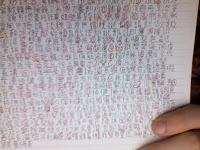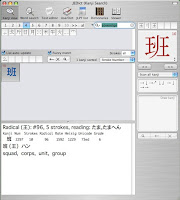 The desktop of a Japanese-studyaholic.
The desktop of a Japanese-studyaholic.Non-Japanese studiers, my
apologies. Hey, we'll have a youtube video up for you tomorrow to satisify your watch-Clay-be-dumb needs. But right now I need to show my ignorance to the world in my usual linguistic-related manner...
--
I've become a big supporter of the Heisig method recently. I have a friend here at the school that complains it is too late to try the Heisig meathod. But I've found it to
not be a problem to throw away my old mnemonics, or keep them, depending on how useful they are. It's quite easy. There are plenty of little things that I don't agree with about the books (mostly the adherence to Jyouyou of the first book, but occasionally mnemonic-wise too), but overall I find his methods to be best for memorizing, differentiating and being able to actually write kanji by hand. For instance, take 又, the kanji for "again". Now, conventional mnemonic making wisdom would have us use it as "again" in other kanjis and try to make our stories that way. But Heisig came up with a clever thing: he gives lots of kanji a different meaning when they appear as radicals. In this case, 又 becomes a crotch. As you can imagine (literally), this works much better for making outrageous stories. Outrageous or odd=easy to remember. Let me give another example: 池 is pond. The right part is given the arbitrary meaning of scorpion whenever it appears as a radical. But Heisig cautions to not come up with a dull story about how scorpions live in ponds. He suggested a pond being created, drip by drip, from a scorpion's stinger. Now that is an image that sticks. Here's one I thought up for alms (
施):
Some people go to the four corners of the compass and recline in the streets to get pity money and alms. If you ignore these loafs, they may slip a scorpion under your door. Such is the price to pay if you scorn a beggar.
I doubled up on meaning for 方 in this one, and added a clue as to the placement of the scorpion radical. In fact, I try to make my story follow the drawing order when possible. In addition, I am sure to picture a gap-toothed miscreant pulling a scorpion out of his dirty coat. For more on the usefulness of vivid mnemonics, I recommend the
Derren Brown book Tricks of the Mind. He's the guy that did the zombie-related hypnosis vid that was all over the net a while back, BTW, FTW, ROFL, A*.
Anyways, as the title promised,
here is a link to an Anki decks one of which you can use to study kanji, using Heisig's keywords. It is tagged throughout according to JLPT level. I of course am using it to get the 1kyu kanji down pat.
I'm studying 50 a day (via the settings I chose). My
study method is as follows: read the "English reading", recall the story, draw the kanji, check
and circle, with a red pen, parts that are sticklers for my memory (this circling-thing is
not part of the Heisig method, but actually another method developed by a Japanese professor and made into a
DS game I happen to own). If I can't recall anything, I use the Heisig number (shown automatically at answer time) to
do a search in my PDF version of the books (really, a fast process with OS X).
There is only one side to these cards; if you can reproduce the kanji, you haven't much need to check the other; try reading afterwards and the kanji you have mastered should be salient. Also, I have tagged a few kanji with "p" for "primitive" (to which the deck is
schedualed to give priority), but this deck was not originally made by me, and so there are tons of kanji that could potentially get this treatment (there are also a lot of annoying commas where spaces should be; I got rid of some). I also tag kanji that I don't want to bother with at this point in my kanji career due my suspicion that I won't see them on the test. If you download the deck, keep in mind x cards are automatically suspended from the schedules.
Feel free to modify those cards, especially if you feel, as I do, that the readings can be a bit off. I often check the kanji in the program that I am going to mention in a second:
On to that second tool I put in the title: a program which is, as far as I know, only for Macs. It's called
JEDict. Recently,
Deas mentioned a Mac app to help one see kanji better and thus illuminate stroke order, but I feel this is vastly superior (sorry Deas). For one thing,
it will show you the stroke order and animate said strokes. It will show you the radicals that make up a kanji. It will let you grab those radicals and copy them or put them in the creation boxes to see related kanji. And that is just a small part to JEDict, because it is a dictionary. It's been invaluable during these internet-less days (heck, faster than a WWWJDIC search). It keeps track of your clipboard, so if you copy text anywhere on your computer, it is ready to search those words for you. JEDict is so dreamy... sigh... why haven't you downloaded it yet? I really like
the feature that allows me to save terms. I save tons of
yojijukugos. Gotta keep up with the
neighbors.
--
There are other things that have helped me with kanji a lot over the last year. I got used to drawing them in the first place thanks to
Kakitorikun and my
DS dictionary, which is still super-useful--I haven't felt the need to upgrade to a "real"
denshijisho. I also find my kanji textbook to be useful, but only because of the daily quizzes in class are on it, and I also have to write down all the definitions on a worksheet. So what can I say except, go to Japanese school. :/
--
Next time: We'll make our own primitive!
*:A stands for acronym
Pics in case you missed the links to them in the text:












